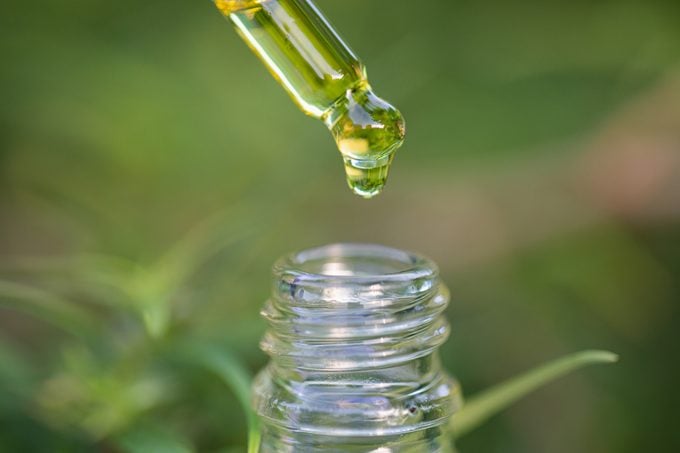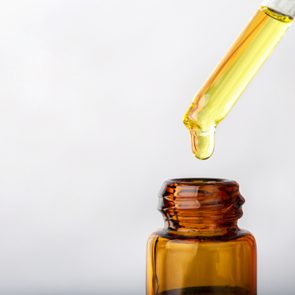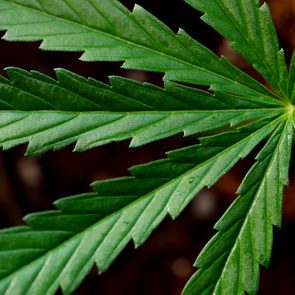What’s the Difference Between CBD Oil vs. Hemp Oil?
Updated: May 13, 2021
CBD oil and hemp oil are both derived from the cannabis plant and can be used topically or ingested, yet there are key differences. Check out the benefits and risks of CBD oil vs. hemp oil.
Hemp oil vs. CBD oil
If you’re curious about using natural oils for health ailments, you’re probably familiar with hemp oil and CBD oil, also known as cannabidiol oil.
It can be hard to understand the difference between the two since they’re often used interchangeably. Yes, they both come from the Cannabis sativa plant. And, yes, they both can be used topically or ingested.
But there are key differences between these two oils and how they may impact your overall health. (Here’s what you need to know about CBD oil for insomnia.)
Here’s a closer look at these two popular natural oils and what you need to know about each.
The difference between hemp oil and hemp seed oil
To know the difference between CBD and hemp oil, you first need to know exactly what hemp oil is. While “hemp oil” may be used as a shorthand for hemp seed oil, they are actually not the same thing.
Hemp seed oil comes from the seeds of the hemp plant. While marijuana and hemp are both Cannabis sativa plants, they are different varieties.
Hemp plants contain little or no delta-9-tetrahydrocannabinol, or THC, the main active ingredient in marijuana. (In fact, hemp plants must contain 0.3 percent or less THC to be grown legally, while marijuana plants in states with legal marijuana can have 12 to 25 percent or more.)
The seeds of the hemp plant don’t naturally contain either THC or CBD, although they sometimes can become contaminated by trace amounts during processing. Therefore hemp seed oil doesn’t contain THC or CBD, and is valued more for its nutrients and moisturizing properties. (
It’s often used in food and beauty products, but don’t look to hemp seed oil for the cannabinoids found in the rest of the plant, which are thought to be useful for treating certain conditions. (Here’s what you need to know about CBD vs THC.)
On the other hand, hemp oil is extracted from the stems, leaves, and flowers of the hemp plant, which do contain CBD and sometimes small amounts of THC. Hemp oil would be considered a full-spectrum oil—it contains all the compounds found in the plant—and may be higher or lower in CBD, depending on the source of the product.
CBD oil, on the other hand, is specifically meant to contain the compound that’s been found to be useful as a remedy for seizures, pain, anxiety, and other health problems. (And to make it ever more confusing, CBD oil can be derived from either marijuana or hemp plants.)

Uses of hemp seed oil
Hemp seed oil has a grassy smell and taste, and a greenish hue. Hemp seeds and hemp seed oil are nutrition powerhouses chock-full of inflammation-fighting omega-3 and omega-6 fatty acids and antioxidants. (Here’s the difference between hemp hearts and hemp seeds as well as five other tiny superseeds you should know.)
Because it’s packed with healthy fats, hemp seed oil is often added to food and even used as a cooking oil. Hemp seeds, which have a mild nutty taste, can be added to food for a nutritional boost, as well. Hemp oil is also a popular ingredient in skin care products, such as hemp body lotion.
People rarely use hemp seed oil for recreational or healing purposes because it has little to no CBD or THC.
Benefits of hemp seed oil
In addition to omega-3 and omega-6 fatty acids, hemp oil contains gamma-linoleic acid (GLA). All of these “good fats” have an array of proven and potential benefits.
For example, omega-3s have been linked to better heart health. They may also help control symptoms in people with eczema, lupus, and rheumatoid arthritis, and may even help ward off vision loss and dementia, according to the National Institutes of Health.
Hemp seeds are also a rich source of protein and magnesium. Thanks to their fiber content, they also promote digestive health.
How does hemp seed oil interact with the body?
The fats in hemp oil have a variety of effects on the body. They are key components of cell membranes and hormones, and also have anti-inflammatory effects.
Side effects of hemp seed oil
Consuming hemp seed oil or hemp seeds may cause digestive issues like diarrhea, but it is generally considered safe.
CBD oil
CBD oil can be derived or extracted from hemp plants. It can also be produced from higher-THC marijuana plants in states where the plants are legal. But it’s produced using the flowers, leaves, and stems of the plant, not the seeds.
The surface of the plants are studded with trichomes—tiny hair-like projections that produce varying quantities of CBD, THC, and more than 100 other cannabinoids—as well as other beneficial (and non-intoxicating) chemicals to protect the plant from pests and ultraviolet rays.
Benefits of CBD oil
The benefits of CBD oil are still being investigated. But there’s tantalizing evidence (most from studies in laboratory dishes and mice, as opposed to humans) to suggest that the cannabinoid may help with sleep, anxiety, and pain. (Here’s what doctors wish you knew about CBD and anxiety.)
Types of CBD oil
Raw CBD oil
Raw CBD oil hasn’t been processed after extraction from the plant. It may contain the CBD precursor, CBD-acid (CBDA), which some research suggests may have its own health benefits.
CBD concentrate
CBD concentrate has been filtered and processed to increase its potency. This category includes full-spectrum CBD oil, which contains the other cannabinoids and compounds found in the plant, including THC; and broad-spectrum CBD oil, which has been further processed to remove the THC.
CBD-infused oil
CBD-infused oil includes CBD concentrates. This category can also refer to an oil to which CBD isolate (a super-concentrated, near-pure CBD product) has been added.
CBD-rich oil
CBD-rich oil includes full-spectrum CBD oil, broad-spectrum CBD oil, and CBD-infused oil.
How does CBD oil interact with the body?
The effects of CBD in the body and brain is still not fully understood, but it appears to reinforce and support the endocannabinoid system (ECS), says Greg Gerdeman, PhD, a cannabis neuroscientist and educator.
The ECS is made up of cannabinoid-like chemicals naturally produced by the body called endocannabinoids, the cell surface receptors that interact with them, and the enzymes that break them down. It’s critical to maintaining homeostasis, or balance, in the body, Gerdeman says. “There’s a lot of basic science to show that the endocannabinoid system is a buffer against stress.”
In addition to supporting the ECS, he adds, CBD is also an antioxidant, and animal studies suggest it has neuroprotective effects.
What are the side effects of CBD oil?
CBD oil is generally considered to be safe. But it can react with many medications, making them more or less effective.
“Even though it doesn’t get you high, it can interact with a lot of drugs, and that can be a potentially helpful thing or it can be very dangerous,” says Martin A. Lee, co-founder and director of Project CBD, a California non-profit that promotes CBD research. (Find out more about why CBD doesn’t get you high.)
CBD extraction, from high tech to DIY
One of the safest methods for extracting CBD from plants is with supercritical carbon dioxide, which yields a golden, waxy oil.
Ethanol can also be used to make tinctures of cannabis, an old-school remedy that the U.S. Pharmacopeia recommended for nerve pain, depression, and muscle spasms in the 19th century. A drawback of alcohol tinctures is that they may contain chlorophyll, lending an unpleasant taste.
Another method, hydrocarbon extraction, uses butane and other extremely flammable solvents, which can leave a toxic residue in the extract.
There’s also the safer, healthier do-it-yourself option: extracting CBD from cannabis by using oil-based solvents such as olive oil, coconut oil, or even hemp seed oil.
Beware of false positives
If you’re concerned about a positive drug test for marijuana but still want to use CBD, your best bet is to find it in isolate form, so there’s very little chance you’ll be exposed to enough THC to flunk a drug test.
But consumers who want to use CBD oil need to do their own due diligence to ensure that the product they buy contains what the label says it does. The CBD boom—along with spotty regulation—has led to multiple dubious products finding their way to drugstore and gas station shelves.
In a study published in 2020 in the Journal of Dietary Supplements, researchers found that only three of the 25 hemp oil products they purchased in Mississippi contained an amount of CBD within 20 percent of the amount claimed on the label. Fifteen had much less CBD than they claimed. And two had over 50 percent more. (Five products did not make any CBD content claims.)
Three products they tested contained THC in excess of the legal 0.3 percent limit, while four contained synthetic cannabinoids—lab-produced substances with cannabis-like properties (such as K2 and Spice) that can cause seizures, psychosis, and even death, according to the Centers for Disease Control and Prevention.
Third-party-tested CBD is your best bet
If you live in a state with legal marijuana, you may have access to state-licensed dispensaries, which are required to test the potency and purity of their CBD products.
If you don’t, you can still make sure that the CBD products you buy have been independently tested. The manufacturer should have a Certificate of Analysis from a third party available for the product that confirms its claimed CBD content, and shows that it’s been tested for contaminants like heavy metals and mold. Some products even have a QR code on the label so you can download the COA and peruse it before purchase.




















